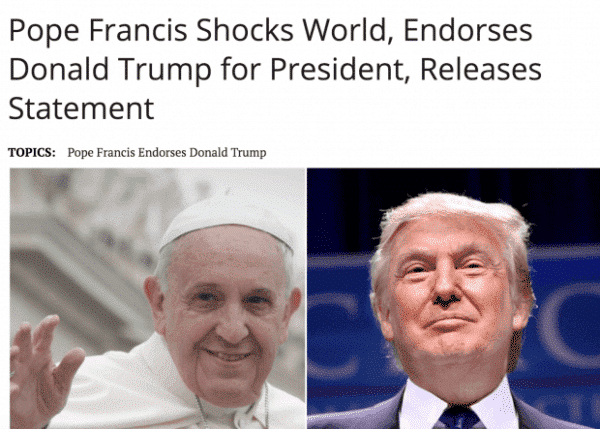

It seems that the fake news conundrum is on everyone’s mind these days. From U.S. President Barack Obama’s reported “obsession” over the topic ever since November’s U.S. elections, to all of Europe’s new nervousness about how Russian-generated misinformation might impact upcoming elections in the region. The problem, according to some, has emerged as a serious threat both to journalism and democracy itself.
Fake news is everywhere (on the internet, mostly). It’s in news stories on your Facebook feed that look … real, and, importantly, come with a juicy tag line -Taylor Swift endorses Trump for President! Angel Merkel was in the East German Stasi! Halal certification industry linked to terrorism!
Pizzagate!
All just mindless drivel, right? Nothing to be worried about, as in, who would ever read such claptrap and take it seriously?
A lot of folks, apparently. According to an analysis by BuzzFeed News, during the run-up to the U.S. election, fake election news items actually generated more engagement in terms of shares, reactions and comments, than real election news items from all the major news outlets, including the New York Times, Washington Post and NBC News.
In terms of its geopolitical influence, Western media has all but put the blame for Donald Trump’s win on the flood of misinformation coming from Russian and Macedonian-sourced websites, something the Swedish Security Police had called a concerted effort in psychological warfare.
Obama has spoken on the topic, too, urging that, “In an age where there’s so much active misinformation, and it’s packaged very well, and it looks the same when you see it on a Facebook page or you turn on your television … If we can’t discriminate between serious arguments and propaganda, then we have problems.”
A genuine issue, no doubt. But is fake news a threat to the journalistic enterprise itself?
Concordia University in Montreal recently put the question to the students and staff of its journalism program, who appear to be taking the problem of fake news very seriously.
To some, such as Brian Gabrial, associate professor of journalism, what’s changed about fake news today is both the content and the packaging, which, in their current online form makes all the difference. “Fake news has always been around but it was normally sold as a tabloid in the supermarket,” says Gabrial. “And everyone knew that when the rat ate the child’s face off —that wasn’t real.”
Others spoke of the role to be played by journalists in separating themselves and their craft from the horde of tricksters. “Fake news has nothing to do with journalism,” says Donna Nebenzahl, a part-time journalism professor at Concordia and a regular contributor to the Montreal Gazette. “This is really about technology, because without it people would know where the material is coming from.”
The pressure is on journalists both current and upcoming, says Nebenzahl, to uphold the standards of their profession and maintain a high degree of integrity in the face of all the “post-truth” out there. “We have to get serious and we have to understand what it is we’re doing here,” says Nebenzahl.
Leave a Reply
You must be logged in to post a comment.




 Share
Share Tweet
Tweet Share
Share




Comment